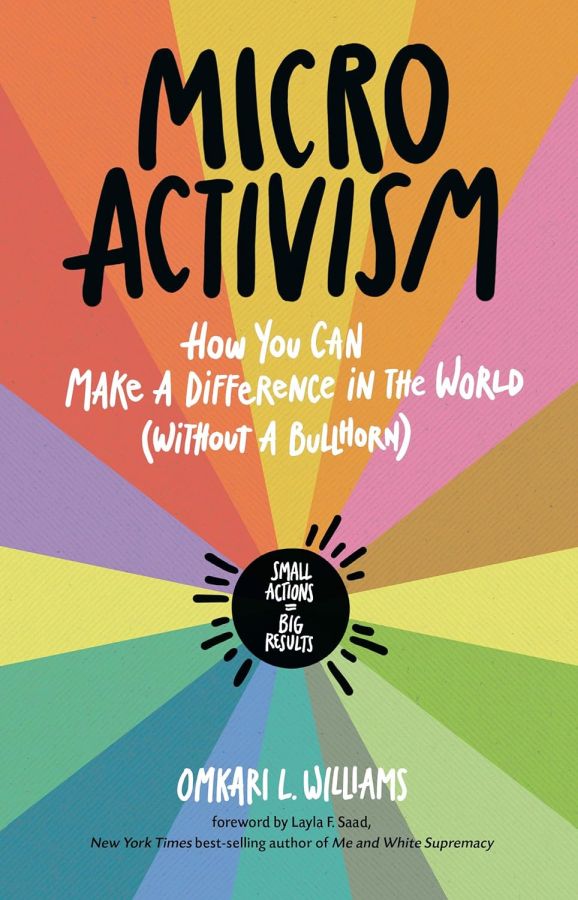For nearly a decade now, the majority of my activism efforts have focused on access to inclusive and comprehensive sexuality education. I’ve volunteered for sex ed organizations. I’ve donated money to them. I’ve engaged in craftivism around the topic. My journalism and copywriting work has focused on sex ed advocacy. I’ve even created a by-god sex ed website that I continue to maintain, with a corresponding newsletter that I hope helps to educate others (especially parents and other caregivers) on the importance of sex ed for all.
But as in everything, I have impostor syndrome around my advocacy work:
If I am not at all the rallies, holding the megaphone, making phone calls, running for my district’s school board, am I doing enough?
If I am not also fully engaged in the many other causes and issues I find important—from intimate personal violence to sustainability to bigotry to full-on war—am I doing enough?
And in the face of endless book challenges, vicious disinformation campaigns, and the introduction so many bills that seek to pass hate into law… is it okay that, sometimes, I feel tired?
If you relate to any of this, raise your hand. And then pick up a copy of Micro Activism by Omkari L. Williams.
Micro Activism and How to Make a Difference in a Way That Works for You
Chances are high that if you’re a Feminist Book Club regular, you recognize the title (and/or its vibrantly colored cover). It was included in our special edition winter box: Activism As Community Care. When I picked up my own copy late last year, I was grappling with all of the questions I mention above. As someone who eschews particular types of advocacy work because of introversion and chronic anxiety, I was especially concerned that I couldn’t even count myself as an activist. The subtitle of this book—How You Can Make a Difference in the World (Without a Bullhorn)—spoke to me.
The book itself is a quick little gem of a read, one that tackles everything from what an activist looks like to finding your community to building resilience and more.
But the two lessons that really leapt out at me were those on finding your focus and leaning into your strengths.
On Finding Your Focus When the World Is Burning

My god, it’s hard to know where to look when no matter where you turn, something is terrible. Various issues in my own feeds include book bans, the evils of the beauty industry, abortion rights, disability rights, anti-fat bias, anti-trans legislation, Margot Robbie and Greta Gerwig being snubbed by the Oscars, and Nazis running rampant on Substack. Oh, and of course there’s the Israeli-Hamas conflict, which has recently overshadowed other global conflicts like the Russo-Ukrainian War, the crisis in the Congo, the war in Sudan, and hell, I could go on. It’s enough to make you feel completely fracking useless which, by extension, can squash any motivation to try to effect positive change.
Williams’ advice? She calls it the Noah’s Ark Rule. “Pick two,” she writes.
“Putting your focus on just one or two issues can help you persist in your activist work. What do you do when picking only two can feel like abandoning the rest of the deserving causes that are out there? There is an enormous amount of need in the world. Any one of the causes that made your ‘what I stand for’ list is urgent enough to focus on for an entire lifetime.”
Omkari L. Williams, Micro Activism
Williams suggests that if you have trouble picking just two, you should do some soul searching, interrogating what it is that made you an activist in the first place, and how your personal story informs what it is you care about most.
On Deciding What Activism Looks Like for You
In her book, Williams identified four activist archetypes: The Indispensable, The Producer, The Organizer, and The Headliner. As someone who is for sure not the headliner, I appreciated the way Williams was intentional about sharing various forms of activist work that takes place outside the spotlight, from telling stories and sharing resources to researching legal support and “calling in” folks who engage in problematic speech or behavior.
I dig this. It feels good to know you can make a difference in the world, even if you’re not the one with the bullhorn, the one in the spotlight, the one operating as the face of a movement. Instead, you can make a difference by focusing on the handful of small things at which you excel. The things that are totes in your wheelhouse, like writing articles and op-eds or curating resources or teaching small workshops or even spreadsheeting the hell out of an initiative.
In this way, you can support the movements that matter to you, and you can do it in a way that’s sustainable.
I was recently reminded of the breadth of possibility in advocacy work when reviewing lesson plans on social activism and being a changemaker, materials that were made available to me when I began a new volunteer gig. To drive home the fact that there are so many ways to be an activist, I wanted to share just a few types of activism here, while also highlighting why certain options might not be the best fit for some folks.
Group Actions. Think marches. Rallies. Strikes. Sit-ins and walk-outs. When a large group of people makes themselves an inconvenience to those in power, simultaneously drawing attention to an issue, it can be difficult to ignore. This can be a great way to be in community with other activists, and to make your voice heard but, depending upon your abilities, it may also not be the best option for you.
Voting. Because so many of the issues we face are systemic, the only way to make real change is to pass legislation in support of that change. And we get closer to that possibility when we vote in the folks who also support that change. Because of various forms of voter suppression, however, particularly within marginalized communities, it’s not always possible to get to the ballot box.
Phone calls and letter writing. Does anyone else remember the virtual postcard writing party we had here at Feminist Book Club, when we sent postcards of support to healthcare/abortion providers? Such feel-good fun! Inundating your representatives’ phone lines with calls about the issues you care about can be a great way to show your reps which issues matter most to their constituents. But if the thought of cold calling someone gives you the cold sweats, writing letters, op-eds, and even postcards can be a good alternative.
Educating yourself and others. Educating others is a big part of what I try to do, whether with my journalism work, my newsletters, or my website. I love using writing as a tool for advocacy because, well…I feel like I’m better in writing. At the same time, I’m always trying to educate myself, too, whether by reading or listening to other voices or by being open to feedback when someone else calls me in for my own missteps.
Monetary support. Whether via one-off donations, recurring donations, or the organization of a whole-ass fundraising event, financially supporting the organizations that are Doing The Work(tm) —if you have the means—can be helpful to a cause.
Running for office. If you have the chutzpah (and the time) for it, running for office—whether for your local Board of Education or Town Council, or for a higher-profile position—can allow you to directly impact policy.
Mutual aid and other community organizing efforts. I adore mutual aid organizations, the way they bring a community together to support itself in ways that are actually impactful. On top of running a community fridge, providing first aid and CPR training, providing shelter to unhoused folks, and more, my local Black Lives Matter chapter regularly advocates to make their city safer. Are there groups working out of churches or neighborhood associations in your area that could use your support?
Volunteering. There are so many different ways to volunteer, ways that are more public-facing and ways that support an organization behind the scenes. I’ve taught music classes at my local “safety town” program (for incoming Kindergartners) and participated in multiple mentorship programs. But I’ve also lurked behind my keyboard as the volunteer editor of a literary magazine, and created blog content for a sex ed organization. I love that there are so many different ways to help out, no matter what one’s skill set may be.
This list is not exhaustive, but I’ll stop here anyway. I hope it inspires you to seek out volunteer opportunities that play to your strengths.
A Note on Activist Burnout
Limiting your focus to one or two big issues and playing to your strengths as an activist are two fantastic ways to engage in activism in a way that’s sustainable.
But again, it can be difficult to avoid activist burnout, to avoid feeling overwhelmed and helpless and mad as hell. Williams’ book has an entire chapter on building resilience. In it, she urges folks to remember they’re not alone, to incorporate restorative time, to embrace micro actions, to celebrate their wins, and more. These are all crucial, and I encourage you to read Williams’ book to learn more.
Speaking of that book…
We only have a small handful of our Activism As Community Care boxes left, which include—in addition to Micro Activism—It’s Not (All) Your Fault: Self-Help & the Individualization of Oppression by Sharon Podobnik, the Rest Deck, and a Luna Moth journal. If you’d like the chance to win one of your very own boxes, you’re in luck. We’re giving one of those boxes away to one lucky reader! All you have to do is leave your information in the table below to enter to win. Having trouble viewing the table on this page? Enter to win here!


